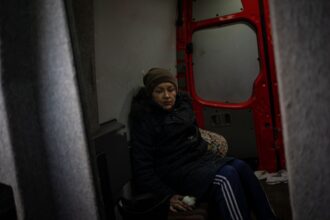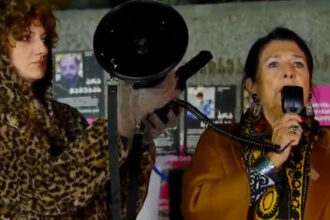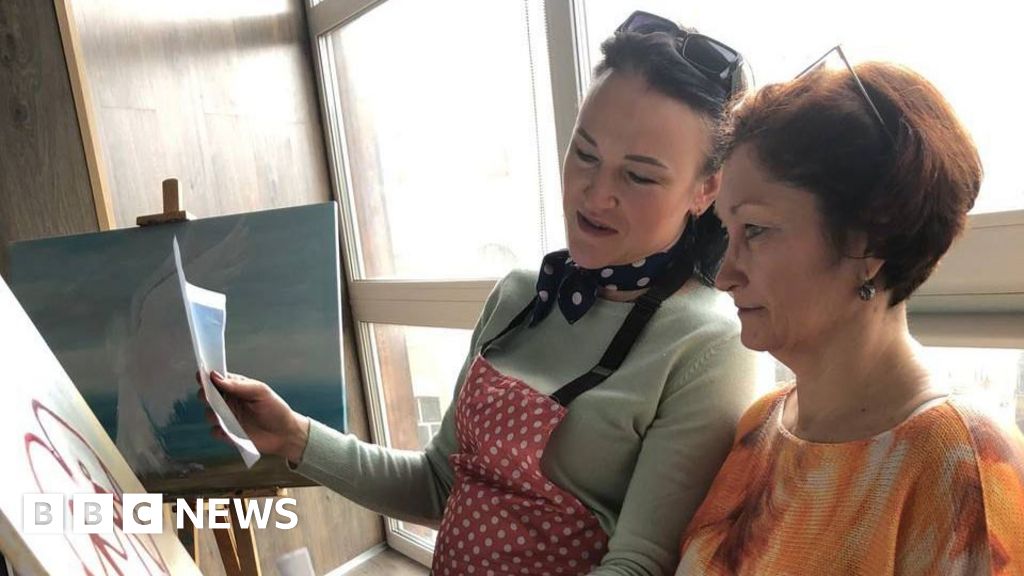Pavlo, the husband of Maria Ivashchenko, volunteered to fight on the day that Russia invaded Ukraine 2022.
Six months later he was killed by Ukrainian forces in a counter-offensive near Kherson. Maria is now one of the many Ukrainians who lost loved ones during the war.
Maria attends therapy classes organized by Alive, a volunteer group. True Love Stories.
The widows and mothers who lost loved ones in combat express their feelings and seek closure through painting. The women then write stories about their love to accompany their paintings.
Maria says painting can help externalise memories and moments people are afraid to relive.
“There is total trust.” “No one will judge whether you laugh or you cry,” she continues. “They will understand you unconditionally.” “There’s no need to say anything.”
“There’s a good reason why Alive is called that. We returned to life. This project has brought many of us back to life.
Olena Sokalska is the founder of Alive. She says that more than 250 women are involved in her project and there’s a waiting list with about 3,000 names.
Olena says the paintings are usually scenes that remind women of their dreams or memories of time spent with their loved one. Olena says that some women paint themselves or their spouses.
She says that “very often, they paint angels. Their families or children are also depicted as Angels.” “These paintings represent the end of their life and the beginning of a brand new one.”
The mental agony that war causes
The dangers and insecurities that accompany war have affected millions.
Anna Stativka is a Ukrainian psychotherapist who explains that people lose their basic human needs when wars begin.
“When these basic resources disappear very suddenly, it creates a great deal of stress.”
In situations of sustained war, symptoms can include anxiety, depression and insomnia.
“You can’t remain in this hyper alert mode for too long,” Ms Stativka said, adding that it has negative effects on mental and physical health.
She says, “This is what is happening in the Ukrainian society as a whole.”
The scale of the crisis
According to statistics, the number of Ukrainians with mental health problems is increasing.
According to the Ukrainian Health Ministry the number of patients who have complained of mental health issues this year has more than doubled from 2023. Market research data also shows that antidepressant sales are up almost 50% since the year 2021.
According to a study published in The Lancet, 54% of Ukrainians, including refugees, have PTSD. Twenty-one percent of Ukrainians suffer from severe anxiety, while 18% experience high levels stress.
A study conducted in 2023 revealed that 27% of Ukrainians were depressed or very unhappy, compared to 20% in 2021 – the year before Russia’s full scale invasion.
According to the World Health Organisation (WHO), the majority of Ukraine’s population could be suffering from war-related distress.
“It could have different symptoms.” Some people feel sadness, others anxiety, some sleep problems, and some fatigue. Some people are becoming more angry. Jarno Habicht told the BBC that some people suffer from unexplained somatic disorders, such as pain or feeling unwell.
Crisis response
Mr Habicht says that Ukraine has made progress in addressing the acute crisis, and overcoming the stigma associated with mental illness from the Soviet era.
He says mental health was a priority during the first months after the war. Habicht says that Ukraine started talking about mental health.
Olena Zelenska, Ukraine’s First Lady, is leading a mental-health campaign called “How are you?” She also hosted the Third Summit of First Ladies and Gentlemen, which focused on mental health during wartime. Stephen Fry, a British broadcaster and mental health activist, co-hosted the event.
In an interview on BBC’s Ukrainecast program, Mr Fry called the mental health issues facing Ukraine an “urgent crises”, but he was impressed by the efforts of Ukraine to address them.
“It is amazing to me that this is discussed in Ukraine,” Mr Fry said. “It’s a strength for Ukraine.” The day Russians begin to discuss the mental health of soldiers and the crises that exist among them, will be the day it moves away from the totalitarian horrors in which it appears to be mired.
According to psychotherapist Anna Stativka one way that Ukrainian society has responded the trauma of war was by coming together.
She says people are generally more polite and willing to help each other, even in public. “People are talking to their neighbours more. Many people are volunteering, donating and trying to help one another. This is a stabilising factor. She says, “We see a lot more trust and empathy between people.”
Maria Ivashchenko now raises four children by herself. She is smiling again – even if it’s through tears at times. His message to those who are struggling to cope with their loss is “Don’t hesitate to talk to others.” Get out of your bubble. “Don’t be alone.”
“The most important thing to remember is to never give up, and to never think that you are alone in the world or that no one cares. “Oh yes, they do,” says she.
“Our husbands didn’t go to war so we could sit around and cry, but so we can keep moving forward, so we can keep living.”
Ukrainians are working to cope with the trauma of this war now.
Read More @ www.bbc.com




